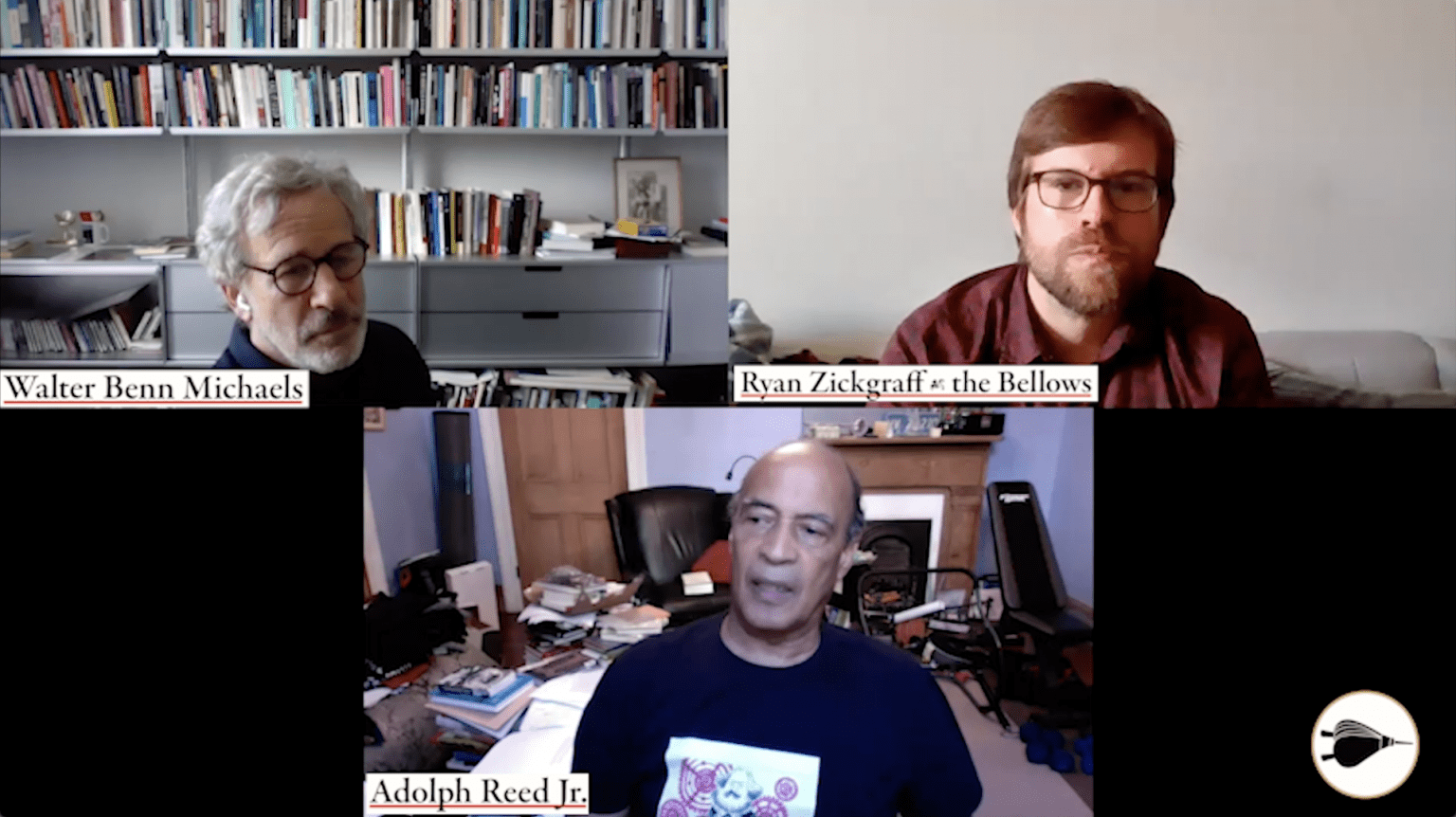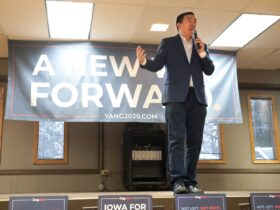In case you missed it, you can watch The Bellows’s first-ever live event: A conversation with Adolph Reed Jr. and Walter Benn Michaels.
The Bellows cofounder Ryan Zickgraf spoke at length with Reed and Michaels about the recent protests, their historic context, and their relationship to neoliberalism. Also: Reed’s 2016 essay on Nonsite: How Racial Disparity Does Not Help Make Sense of Patterns of Police Violence. Reed and Michaels also spoke about the pandemic and an article Reed co-authored in the New England Journal of Medicine on America’s COVID-19 racial death gap.
Reed is a political scientist and author of numerous books and articles. Michaels is an English professor at the University of Illinois-Chicago and author of several books, including the 2006 polemic The Trouble With Diversity: How We Learned to Love Identity and Ignore Inequality.
The following is a partial transcript of their conversation:
RYAN: First off, the protests are everywhere, everyone’s talking about it. What are you seeing, and how are you responding to what you’re seeing in the streets?
REED: One way to start would be to say that this is evidence that the masses everywhere are craving revolution, but of course it’s not. These protests are episodic and that’s one thing to consider. Mass actions are appealing in the U.S. at this point, in part because there’s no central focus to them and they can be ventriloquized pretty easily, right?
So, “what the people in the streets are demanding is X.” It’s certain that there’s a connection between the persistence of police violence and popular response. The George Floyd case in particular was a particularly gruesome one that drew people’s attention, but I think more important than the fact that people are in the streets is to think about what the consequences are of being in the streets is going to be. I mean, that’s what’s most likely to come out the other end of it and maybe that’s one thing we could talk about. It’s almost like a cyclical thing now, and I don’t mean to make light of the murder of George Floyd, which was clearly murder, but the real issue is going to be what the policy-oriented takeaway from this moment is.
I think that’s true both of the crisis around the pandemic and crisis around police violence at this point. The standard tendency among progressives is to think that because there are a lot of people in the street that means something big and transformative in a good or a progressive way is on the agenda. That has not been the case for quite some time. I think about Occupy, the Million Man March, other stuff out of the globalization movement, and the real politics here is about who’s going win the interpretation of what police reform ought to look like, or what the problems of hyper-policing actually are, and what they stem from. We’ve already seen $1.7 billion dollars that some of the most reprehensible corporations in the world have been pumping into showing support to Black Lives Matter. The American Legislative Exchange Council – ALEC, the Koch brothers thing – just put out its statement against racism in policing. So that’s my CliffsNotes for you.
BENN MICHAELS: The murder of George Floyd and what happened to Breonna Taylor; what happened Ahmaud Arbery—that’s all completely unacceptable and completely appalling. It’s completely understandable that people should be in the streets, and it’s right that they should be in the streets. There’s no objection to that. The question is how we understand what comes out of it and how we understand in particular the fact that it’s produced a kind of overwhelming consensus. And there’s a tendency among people to say, ‘Well, the consensus is false, they don’t really mean it. No, Uber isn’t really committed to it, Amazon isn’t really committed to anti-racism.” I think that completely misunderstands it, and I think that’s a point that Cedric [Johnson] really begins to make very strongly in his piece on nonsite. And that is what he calls this expression of militant liberalism.
The “militant” part is this black-white disparity emerging as the absolute fundamental issue. But I think it’s actually a mistake to think that the black-white disparity is the fundamental issue in American inequality and American injustice. Actually, it’s the expression of a certain kind of liberal ideology.
Here’s an easy way to put: if you look at discrepancies of wealth, you can only go so far with reforming the police force if one of the police force’s primary responsibilities is to protect property. If basically 10 percent of the people have all the property, and 90 percent have none, you can reform [the police] till hell freezes over, but as long as it’s doing anything like the job it’s supposed to do, it’s not going to be a job that’s going to be conducive to a socialist state.
So if you look at the way wealth is distributed, if you look at households making $10,000 and under, 56 percent of those households are white. Something like 25 percent is black. If you look at households making between $30,000 and $35,000, (I think) 67 percent of those are white. Everybody says right away, “Well yeah, they’re white, but that’s because there are so many white people. They’re disproportionately black they’re disproportionately brown.” And that’s true. But it’s also profoundly misleading.
Do you remember during the second Obama election, when I think it was Megan Kelly asking Karl Rove as he was trying to assure people that the Republicans could still win the election: “Well, is that real math, or is it Republican math?” So “disproportionate” is liberal math. Because what “disproportionate” wants to say is: “Look, the problem here is that the black population is like 13.2 percent of the American population, but it’s like 25 percent of those making under $10,000, and that’s wrong.” In a certain sense, of course, it is wrong! What does it testify to? It testifies to hundreds of years of slavery, and hundreds of years of racism, and what’s left by that. And ongoing racism as well. But the solution from the “proportionality” argument—the liberal argument—is that the problem here, the primary problem, is not all those people living in households making under $10,000 a year. The primary problem is the disproportion.
That is, the people we should care about and worry about as liberals are the people who are in that bottom group because of a history of racism, sexism, etc. That’s the essence of the sort of liberal theory of equality. So every time you read a story like – the Times just ran one, (there must be a hundred million of them) that says the black-white wealth gap is staying the same or getting much worse—that story you’re reading a story is fundamentally misleading about way inequality works in the U.S. You’re reading a story that says “the problem here is racism, the solution of the problem is anti-racism.”
If you actually could produce that solution—and anti-racism has sold its success on doing so—what you would get isn’t 25 percent of the people at the bottom who are black. It would be 13.2 percent. But that’s not a solution to inequality at all. That’s a solution which actually says: “If you accept the political economy as it is, then you start to rearrange the chairs on the deck of a ship that now looks more and more like it is, that counts as justice.”
But what it is is a militant version of liberalism. It has almost nothing to do with a left politics. And that’s why ALEC is all for it. And they’re sincerely all for it. And that’s why Uber is all for it, and Amazon’s all for it. Because it leaves the structure of wealth completely untouched, and it insists instead that it be redistributed in some degree, not by making the poor richer and the rich poorer, but by making sure that the correct number of black people and brown people are in the top 10 percent and the correct number of black people and brown people are in the bottom 10 percent. And that is completely empty as a left politics.
RYAN: I want to say in response, though, that obviously there’s been some successes with the protests. Don’t you think it’s a good thing that in Minneapolis, the fact that they’re rethinking the police department, and Confederate statues are being taken down?
REED: Yeah, I’d say there have been successes. I’m happy to see Confederate statues taken down. I’m in New Orleans now, and I happened to be here when the big fight over taking down the four most obnoxious statues reached its culmination. I’ve been around this statuary all my life and hated it all my life. I had fantasies as a kid of blowing up the Beauregard statue a couple of blocks from my house. So it’s good, right?
But the other thing that struck me about it is that the way that this project of removing Confederate symbols has proceeded, is one that also kind of reinforces neoliberalism because it’s dependent on characterizing what prompted the replacement of the symbols in the first place, as white supremacy. And it yeah, it kind of was. But it was also a monument to an emerging and consolidating class order in the South at the end of the 19th century. People forget or don’t know that. None of this stuff went up during the Civil War, or even immediately after the treasonous insurrection of the eleven states where the slave-holding elites rose against the US government. It all went up between the mid-1880s and World War I. And those were precisely the years when Southern elites were crafting and imposing white supremacy as a limit on not just politics among black people, but on the possibility of any kind of interracial working-class expression from below. And the narratives that have accompanied their removal like in this city and elsewhere are narratives that basically reinforce triumphant neoliberalism. They’re symbols of a bad old time when there was racial inequality and racial subordination, and we abhor that, and now we have the same logic of inequality and subordination, but it’s not racialized in the same way. So in essence, antiracism is doing the same kind of work for the ruling class that racism did 100 years ago.
BENN MICHAELS: Amen to that. But obviously, if you’re attached to the statues staying up, people say ‘we’ll lose our history to take them down.’ That’s completely empty. Let them come down. The problem of them coming down, though, isn’t even that it’s just symbolic—to some extent is just symbolic—but we should care about the symbols. Nobody wants these symbols. I don’t know if it’s true or not, that the military appeared to be ready to jettison Fort Bragg’s name, until Trump said: “No, no, no, you can’t do that.” So between those two, you’re on the side of the military.
But I think in general, it’s a problem with liberalism. That it’s the sense that we’re fighting over that past here. Liberalism is deeply historicist in the current moment, and far be it for me to be the one to start attacking reparations—that’s usually Adoph’s job—but it is kind of relevant here. The idea that we should be thinking about our current injustices by way of rectifying past injustices seems to me a deep mistake. Think of reparations. So if you’re born poor and black in the U.S. today, it’s not hard to figure out the history. We know why black people are disproportionately poor. We know all that stuff. It’s the slavery, it’s the racism.
But suppose you’re born poor and white, and you’re born poor not because your great-grandparents were slaves, but your grandfather was in a union, and the union was busted, or your dad was, and Reagan busted his union and he lost all his money, and he lost his house that way. And you’re poor for that reason. So reparations—the whole concept of it is—if you’ve got the right account, the right sort of history, the right causal account of how you became poor, then, “OK, we’re going try and do something for you and if you don’t have the right account, then it’s your problem.” Socialism has a great advantage.
Socialism doesn’t give a flying fuck about your causal account of how you became poor. The point is to get rid of poverty. The point is eventually to get rid of classes and class differences. The point is not to reward people who, under certain notions of property, ought to be indemnified for stuff they would have had if bad things hadn’t been done to their ancestors.
I do think we should have a new version of the 11 Thesis which is, “While philosophers have tried to understand the world, the point is to change it.” And I’ve been trying to get Adolph to accept this version without some success, it would be a version that “The bourgeoise have tried to understand history. The point however is to forget it.”
Politically, we don’t need to think that it’s the question of our heritage of injustice that’s produced our problems. We can be completely causal. I follow a bunch of American historians I respect in thinking that the 1619 Project is deeply misleading. I actually think in the end it doesn’t matter who’s right and who’s wrong for the purpose of our current politics. That is, if you’re a socialist. It’s only if you are so deeply committed to liberalism that your sense of your current injustice must be further justified by a history of past injustices that you’re then going to be committed to the idea that being able to tell the right history—being able to tell your story—is a way into a more just situation, and that just seems to me another marker like the proportionality. It’s all militant. To use Cedric’s really, really, useful phrase, it’s all militant liberalism, all the time.
RYAN: Looking at the past, what do you think of some of the comparisons between this moment and Occupy? People are also comparing this to 1968. What do you think of those comparisons?
BENN MICHAELS: It’s useful to note that 1968 was the most equal year in American history in terms of the Gini coefficient measures of inequality. According to the most recent data, 2018 is the most unequal year in American history. The main thing that has happened in those 50 years is that the income gaps and the wealth gaps have gotten way, way worse than they were. Fifty percent of the American population actually has not just gotten proportionately less money, it’s actually less wealth than they had 20 to 30 years ago. So, if you start to think about that comparison, what does it mean to think about the problem of anti-discrimination?
When exploitation has been running wild right during this entire period, it doesn’t mean anti-discrimination isn’t important—obviously, it’s important—but the position of black people has not improved at all. It hasn’t improved. If you’ve got this large population which is falling way behind the people on top, and if that large population is—to do the liberal math—disproportionately black, that large population is disproportionally further behind. All the anti-discrimination stuff has done is actually enable them to keep running even at an already-behind pace. So, everything from that standpoint has gotten worse, and anti-racism obviously cannot solve that problem. If look at like white wealth—basically most of the wealth of the country—almost all the white wealth is held by the top 10 percent. The bottom 30 percent of white people have nothing. If you look at the bottom 30 percent of white people, they have nothing and if you tell them the fundamental problem in this country is racial disparity and you tell them, “the fundamental problem is white supremacy,” you’re going to be saying, “White supremacy has not worked out for you, despite the promise of what it is supposed to bring, it is totally not working.”
RYAN: I’ve heard an interesting argument on Twitter that because these protests about racial issues are more widespread than Occupy, then income inequality must not be that big of a deal.
REED: Well, my first response to that would be to stay off Twitter.
But yeah, it’s a fatuous contention because I think it requires stepping back from a fundamentally televisual understanding of what social and political movements are and what actions mean. This also speaks to why people make the 1968 comparison. Because what they principally go on is news footage of the riots after King was assassinated right? But the context is different.
I happened to be in Seattle for W.T.O. meetings in ‘99 and had to walk through near downtown and when I walked past the young anti-globalization activists, if it was almost like I could see a video of the Democratic convention in 1968 running just behind their eyes and I’m reminded of Marx’s observation: “The first time as tragedy, the second as farce.” Comparisons like that just don’t make any sense because all these moments have in common is that there were a bunch of people in the street. I was talking to a friend of mine years and years ago, an activist in Chicago who went to one of these Midwest Academy activists and organizers meetings, and he was in the United Center. He looked around, and they filled it up with 20,000 and he thought, “Yeah, this is really great. Look at all these people here.” But then he thought “Well, wait, both the Bulls and the Blackhawks do this 41 times a year, not counting the playoffs, right?”
Again, it goes back to the bodies in the street as a marker of something. Coachella puts a bunch of people in the fields. Burning Man gets a lot of people in a desert. But I think a part of the problem now that confronts us is that in in the case both of Occupy and Ferguson and other mass actions in between, there’s a sort of tacit dialogue with the ‘60s or a tacit folktale that people tell themselves about what the insurgencies of the ‘60s were and so forth and so on. I think all of that is inappropriate. In addition to Walter pointing out that 1968 was the least unequal year in American history, the welfare state was robust.
The social movements and the organizations that embodied those social movements had much more political traction. I often shock people when I point out that it’s really possible to feel nostalgic for the presidency of Richard Nixon, because the stuff we got more out of Nixon presidency than we’ve got out of any of the three Democratic presidencies since then. It’s not because Nixon liked us. It’s because those movements and the governing consensus that they had helped to create—which was not the best thing in the world anyway—were stronger and he had to come to terms with them in some way. What we have now is this simulacra, or what my comrade Mark Dudzic calls “a pageantry of protest.” Where people try to enact the popular action and hope that that sparks a movement when the reality is you should be trying to come from the other way around.
BENN MICHAELS: There’s a way to understand 1968 where it’s really is a kind of the beginning of the unclassing of American politics in this regard. A lot of what came out of 1968; if you think about it in the world that Adolph I’ve spent virtually all of our professional lives, the academic world, it’s the beginning of the New Social Movements. Precisely the sense that: “Well, we sort of solved the class problem, (which we totally hadn’t) but the problem now is feminism, anti-racism, etc.” Of course, all those social movements are really, really justified, but they all have something deeply in common as opposed to the class question. Which is that they’re all essentially non-conflictual.
The point of feminism is not that men and women are forever at war, the point of feminism is that men are not in any way superior to women and that’s what has to be honored, acknowledged and enacted all the way through our society. The point of anti-racism is not exactly the same, but the essence of class is conflict. There cannot be a moment where capital and labor sit down and say, “Hey, look, you know, it’s just important that we actually treat each other as equals,” because we’re by definition not equals. That doesn’t mean there wasn’t a period in American history—the so-called you know “compromise,” or whatever it is in the 50s and 60s in which capital and labor went along with a certain kind of relative equality and a certain kind of prosperity. In retrospect it’s obvious that’s just a moment in the struggle between capital and labor.
So, that’s always one of the problems of intersectionality—is that if you can see the questions of race and gender are fundamentally questions of discrimination, the question of class is not a question of discrimination. And a key part of the liberal use of intersectionality is that it turns class into a question of discrimination; as if what we need to do is recognize that being born black or a woman in society as a problem, what we need to produce is technologies to overcome that. And being born poor is a problem we need to produce technologies to overcome that. That’s it! That’s equal opportunity. And there are two problems with it. One is it totally hasn’t worked, and equality of opportunity does not exist any more now than did 50 years ago.
And the second problem is that even if it did work, it would not undermine the fundamental class differences. It would just actually redistribute the people on a supposedly meritocratic basis as to who went where. So there’s an important sense where ‘68 played a fundamental role in that. It was in a way the beginning of what we have now.









